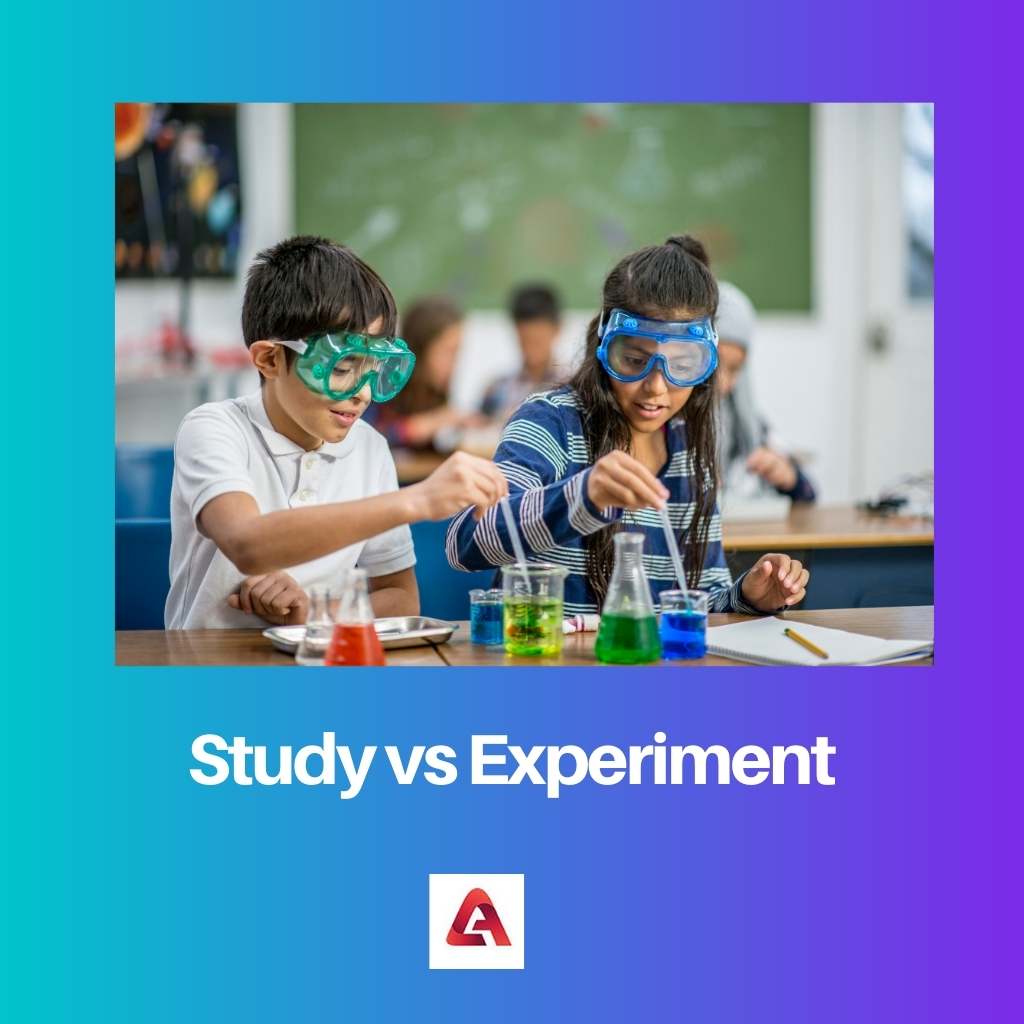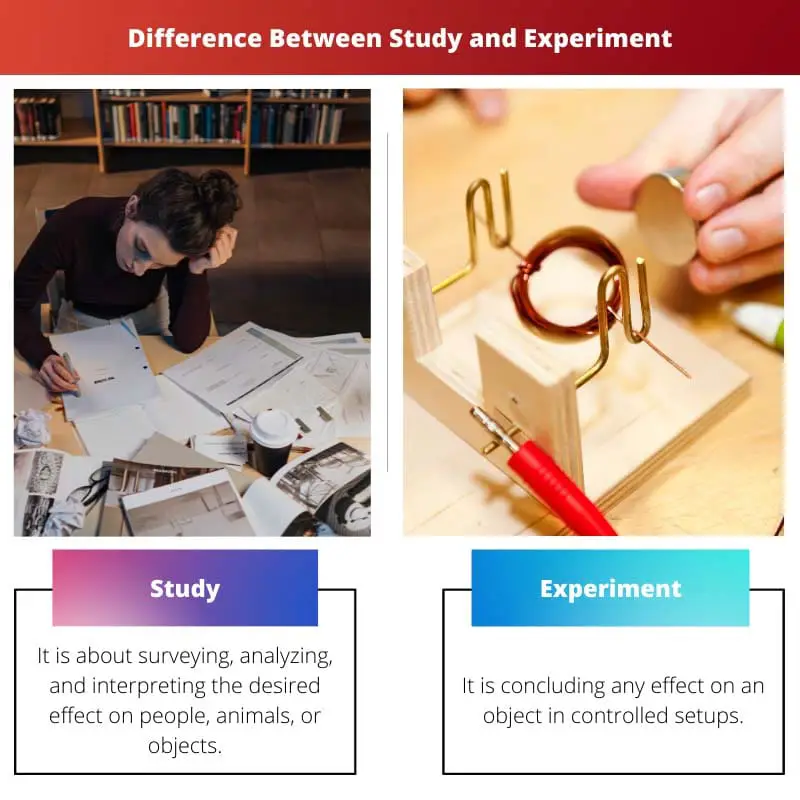Study and Experiment are two terms that differ in their process. The study is to observe, memorize, and gain knowledge through existing material. An experiment is a type of scientific method where things or facts are proven in a controlled environment.
Key Takeaways
- Studies observe and analyze existing data or phenomena, while experiments involve manipulating variables to measure outcomes.
- Experiments can provide causal relationships, whereas studies are more likely to establish correlation.
- Experimental research involves control groups and random assignment, while observational studies rely on naturally occurring data.
Study vs Experiment
The difference between a study and an experiment is that a study is all about surveying, analyzing, and interpreting data, whereas the experiment is the conclusion of any effect on an object. The results that are obtained from the study are weak, and the results obtained from the experiment are stronger and are near the facts as well.

The study is to observe the people, animals, or objects in the environment, which is not manipulated. The members included in the survey are not affected. For example, a survey was conducted on people’s eating habits in a particular area.
The experiment involves a set pattern of the process that may involve some equipment, and the researcher also manipulates the environment.
An experiment requires more time to provide a result, and the result obtained after an experiment is very strong and cannot be challenged easily.
Comparison Table
| Parameters of Comparison | Study | Experiment |
|---|---|---|
| Definition | It is about surveying, analyzing, and interpreting the desired effect on people, animals, or objects. | It is concluding any effect on an object in controlled setups. |
| Reliability | The results obtained by the study are weak. | The results of the experiment are stronger and near to facts. |
| Period | The study of cause and effect is performed in a short period. | An experiment requires more time to provide a result. |
| Characteristic | There is no manipulation of the environment in the Study. | The experiment needs intervention in the natural environment. |
| Cost | The study is economical as it does not need many physical objects. | Experiments are costly because of the involvement of many types of equipment. |
What is Study?
The study is a method to gain more knowledge about any topic. It involves various aspects like our environment, health, growth, eating habits, etc.
It involves meticulous observation, investigation, and analysis of the cause without affecting the natural environment of their subjects. The study works on a hypothesis where variables are observed based on cause and effect.
The cause is not introduced, and the study has no independent variable. However, a group called a control group or standard group can be asserted for comparison.
The study can be of many types. A cohort study surveyed a group of people with common characteristics. Age and gender are included in this category.
In a case-control study, one group with a specific cause is compared with one without the cause. The effects of diseases are investigated in this type of study.
The study on the subjects is quite open and broad. It includes a group that comes in almost the same age group or has the same condition at a particular time.
The study’s result is unreliable because they are riddled with baffling biases and misleading data. In a study, the investigator has no control over participants.
For example, the time spent by children of age group 10-15 on social media is not affected by the researcher’s opinion.

What is an Experiment?
An experiment is a scientific method in which the researcher works on a hypothesis, inserts a cause, and studies the effect of a variable on the other.
The cause is called the independent variable, and the other object of investigation is called the dependent variable. To study the effect of an independent variable, only a group of subjects is kept as a controlled group in which the cause is not administered.
Otherwise, various other effects may hamper the result and provide wrong conclusions.
For example, an experiment is conducted that carbon dioxide is necessary for photosynthesis.
For this similar type of plant is taken and kept in the dark to utilize the storage starch, one plant is kept as a controlled object, and the other is deprived of carbon dioxide to find whether the plant prepares food.
Experiments are very specific and target-oriented. The condition for the experiment is manipulated. The requirement of materials is also the main part of investigating the causes.
So controlled environment, labs, and various equipment make the experimental study costlier. In addition to this, researchers need a long period to draw any conclusions. But the results of the experiment are very strong, and it is difficult to challenge them.

Main Differences Between Study and Experiment
- The study is to gain knowledge about a phenomenon by reading, observing, and analyzing the cause, whereas the Experiment is to test and verify the hypothesis in controlled conditions.
- In the study, the standard or control group is made from the natural environment, whereas in the experiment control group is created by keeping other variables fixed.
- Sample size in a study is chosen from a particular type of group, whereas in an experiment subject is not of a particular type. This helps the researcher to obtain a trustworthy result.
- In the study, the subject is kept in their natural environment. There is no meddling with surroundings, and this makes the study easier, whereas, in the Experiment, researchers manipulate the environment as required. They also use some materials to create that atmosphere. This makes the experiment tougher.
- The study can be conducted on any topic because it does not change the natural environment, whereas the experiment covers a limited area of research.

- https://www.sciencedirect.com/science/article/pii/S0017931015312084
- https://iopscience.iop.org/article/10.1088/0305-4608/11/1/015/meta

The article presents a comparative analysis of study and experiment, elucidating their dissimilarities in a comprehensive manner.
The post meticulously elucidates the disparities between study and experiment, providing an insightful comparison. It equips readers with a lucid understanding of the scientific research methods.
The post provides a detailed explanation of the difference between study and experiment in the scientific process. It emphasizes the importance of each method in the research process.
This article serves as a valuable resource for understanding the divergent approaches of study and experiment in scientific investigations. It facilitates a profound comprehension of the research process.
This is a highly informative article that delves into the contrasting nature of study and experiment. It is a substantial reference source for scientific enthusiasts.
The post effectively highlights the nuances between study and experiment. It enhances the readers’ understanding of scientific research methodologies.
The article offers valuable insights into the mechanisms of study and experiment. It provides a comprehensive comparison that sheds light on their distinctive features.
The post brings clarity to the disparity between study and experiment, enabling readers to discern their individual characteristics and significance in the realm of scientific inquiry.